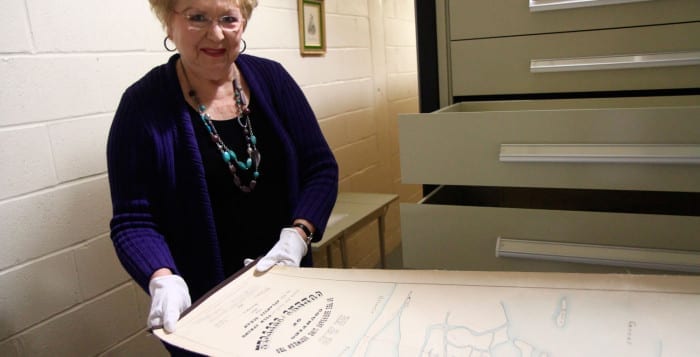Brookhaven Town is calling on those residents who know the area best to help herald in a new era for Route 25A, just weeks after passing a resolution to explore a land use plan and study for the area.
On Feb. 4, the town board created a Citizens Advisory Committee for the Route 25A study and plan, and appointed Three Village’s own George Hoffman of the Setauket Harbor Task Force and Jane Taylor, assistant head of The Stony Brook School, to lead the committee.
The efforts could tie in with similar ones in Port Jefferson Station, where residents, with the help of the town planning department, have already finalized their land use plan for the main drag between the Long Island Rail Road tracks at the northern tip of the hamlet and Route 347 at its center. That main road starts as Route 25A and becomes Route 112.
Brookhaven officials are starting up this year on rezoning parcels in that study area to fit the finalized plan.
In Three Village, the new citizens group will also include members from 12 offices or organizations, including the newly renamed Three Village Civic Association, the office of the president of Stony Brook University, members of the Setauket and Stony Brook fire departments, among others, the town said.
For Hoffman, traffic and pedestrian safety is an area for concern for him and other community members and officials alike. About one-and-a-half years ago Hoffman helped establish a kiosk for an Eagle Scout project near Route 25A and the Stony Brook train station. A car destroyed it nearly a month later, he said.
Hoffman said, “It’s a tricky area and there’s a lot of pedestrians” that walk along Route 25A.
Brookhaven Supervisor Ed Romaine (R) said a Stony Brook University student died several years ago when walking along Route 25A. Many others walk along this road throughout the school year.
“When you have the largest state university in the state of New York, it should have sidewalks,” Romaine said.
Hoffman started working to revitalize the area when he joined the civic association board four years ago. His co-chair, Taylor, has lived in the Stony Brook area since 1973 and said that she was pleased with the news of her position on the committee.
“One of the important values that I have … is to be able to give back to our community in some way,” Taylor said.
Taylor added that it’s exciting to see a variety of local organizations unite for this issue. She also said community input is something the supervisor and town Councilwoman Valerie Cartright (D-Port Jefferson Station) wanted from this land use study.
Cartright has worked with the supervisor to address the Route 25A issues.
Last June, Cartright teamed up with the Three Village Community Trust and organized a meeting with residents to get their input on how they’d like to see the street revitalized. According to Cartright, around 100 community members attended the meeting at The Stony Brook School. While there were some differences in opinion, the majority of residents wanted to “keep the small-town feel” and maintain as much open space as possible.
“I think it is part of the planning process. I think we need to always make sure to have the community [as] involved as possible,” Cartright said.
Cynthia Barnes, president of the Three Village Community Trust, said the corridor study was an opportunity for residents to make sure any past successes were not wiped out by future indifference.
“The community has worked hard to prevent Route 25A from turning into an endless corridor of strip malls like so many other places in Brookhaven and elsewhere,” she said in a statement. “Over the past 20 years, civic leaders have actively engaged in community-based planning, advocating land and historic preservation, scrutinizing development proposals and conducting two planning studies, in 1997 and in 2010. As a result, land has been preserved along 25A and throughout the area and the first of 15 historic districts now in Brookhaven were established here in Setauket and Stony Brook.”
Barnes also said the study is an opportunity for the entire community to “influence policymakers and deciders in how they direct future development and redevelopment along our ‘Main Street.’”
Looking ahead, she said the trust urges everyone to participate in this planning process by seeking out information and watching for meetings and workshops — including the trust’s spring “Join the Conversation” series.
The town will conduct the study in phases starting from the Smithtown line to Nicolls Road while the second phase will focus on the remainder of Route 25A to the Poquott Village line. Although Romaine said there’s “tremendous opportunities for redevelopment” of the street, it will take time to revitalize the area. The supervisor agreed with Cartright that community members are key to a successful study and plan.
Cartright is also involved in revitalizing the Port Jefferson Station-Terryville area to meet the needs of residents. The Citizens Advisory Committee there has presented the town with a vision for the area, which the town previously accepted and then voted on Jan. 14 to start rezoning the area to fit that vision.
Port Jefferson Station’s land use plan was built on existing studies of the area, and the town’s Citizens Advisory Committee meetings will add on to previous Route 25A discussions.
“We’re just at the beginning of the process,” Hoffman said. “We want to build off Valerie’s successful community meeting in the summer. People have different views of how they want their community to look [and] we want to make the area really beautiful [for residents].”
















